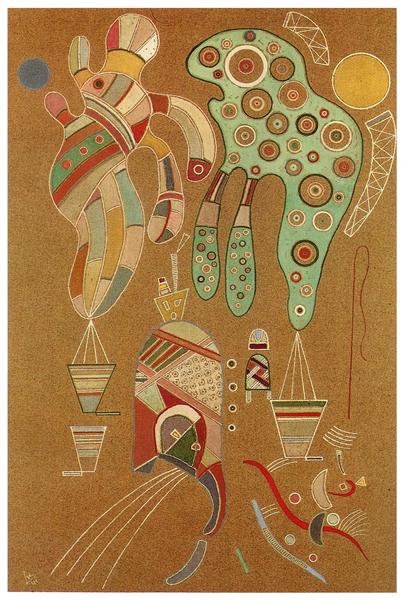Description
The painting "Without title - 1941" by Wassily Kandinsky encapsulates the essence of artist's work in a period marked by introspection and the search for new forms of expression through color and shape. This work, which belongs to one of Kandinsky's most mature moments, is presented as a complex visual network that invites the viewer to enter a world where abstraction and emotion are intertwined.
The first thing that attracts attention in this composition is its vibrant color use. Kandinsky, known for his deep study of color theory and its relationship with emotions, uses a palette that covers warm and cold tones, creating a dynamic balance that gives life to the work. The blue, yellow, red and green seem to interact with each other, suggesting a visual symphony that resonates with the theories that Kandinsky developed in writings as "of the spiritual in art." This emotional perspective of color is fundamental in his work, and in "Without title - 1941" is manifested through a combination of colors that evokes sensations and moods without the need for figurative representations.
The composition of the painting is equally captivating. The disposition of the forms seems to be in constant movement, as if the canvas were vibrating with the energy of the color. You can see various geometric shapes and lines that flow and intertwine, suggesting an abstract visual narrative. Without the presence of recognizable figures, the viewer is forced to interpret and experience the work from a personal perspective, allowing each look to contribute something unique to the interpretation of the same. This feature has been a distinctive seal of Kandinsky's style, where the abstract not only represents a break with visual reality, but seeks a deep dialogue with the viewer.
It is interesting to note that this particular period of Kandinsky's career coincides with significant historical events, such as World War II and its emotional impact. The work can be seen as a response to the seizure of its time, where abstraction becomes a refuge to explore the internal and the subjective, far from outer chaos. This context enriches the work, since it can be read as a meditation on anguish, but also about the hope and creative freedom that abstraction provides.
Although the work carries the denomination of 'Without title', this should not be interpreted as a lack of intention by the artist. On the contrary, the absence of a specific title can allow greater freedom of interpretation. Kandinsky, in his career, often opted for the abstraction that separated from conventional names and categories, challenging the viewer to find his own emotional connection with the work.
Wassily Kandinsky, considered one of the pioneers of abstract painting, had already established a highly personal and distinctive visual language for 1941. Its influence on the artistic movement of the twentieth century is undeniable, and "without title - 1941" serves as an excellent example of his ability to transcend conventional representation, creating a work that is both deeply personal and universal. Painting is a testimony of the power of art to evoke emotions and reflect on the human condition, even in the most challenging moments in history. In short, this work not only adds a chapter to the vast production of Kandinsky, but also stands as a lighthouse of light in the dark panorama of its era, inviting everyone to explore the complexities of its interior.
KUADROS ©, a famous paint on your wall.
Hand-made oil painting reproductions, with the quality of professional artists and the distinctive seal of KUADROS ©.
Art reproduction service with satisfaction guarantee. If you are not completely satisfied with the replica of your painting, we refund your money 100%.

